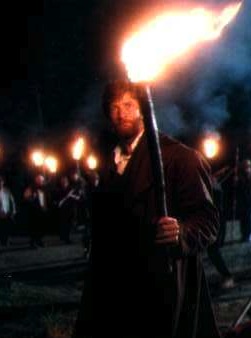January 18, 1986.
SAMUEL LOUNT. Co-Written by Phil Savath. Music by Kitaro. Co-written, co-produced and directed by Laurence Keane. Running time: 96 minutes. Mature entertainment, with the B.C. Ciassifier's warning: occasional violence.
THE SPARKS FROM history's forge have but a moment's brilliance. Though some survive to ignite the flames of glorious legend, there is neither pattern nor justice here.
Consider the events of Feb. 23 to March 6, 1836. Acting against an armed insurrection, Mexican government troops lay siege to a former mission compound occupied by 188 rebels representing a self-styled "independence" movement.
The terrorists assert their right to secede from a nation where slavery is illegal in order to form their own slave-holding state. To the commander of the government forces, they send the message: "Victory or Death."
They die. Their cause, however, is won later the same year by insurgents whose battle cry is "Remember the Alamo! ''
Although the story is told somewhat differently in the United States — the hero-tarnishing slavery issue is invariably omitted —we all remember the Alamo. To date [1986], the legend has been repeated in more than a dozen American-made feature films, all of them lionizing the besieged gunmen.
Now, if you will, consider the events of Dec. 5 to 7, 1837. Acting against an armed insurrection, British militiamen fall upon an encampment in which an unrecorded number of rebels are in the process of dispersal after an unsuccessful march on the colonial capital.
The rebels assert the right of their elected representatives to determine legislative policy and protest that the executive council is deaf to the public will. From the lieutenant governor, they demand a guarantee of "responsible government."
They lose. Their cause, however, is won 12 years later when London acts on a report by its own fact-finding commissioner, Lord Durham.
Their story, if it's still told at all, is a history lesson confined to Canadian classrooms. Despite being the historic spark that led to the adoption of responsible government (a concept basic to all modern Parliamentary democracies), it has never been fanned into the blazing fire of glorious legend.
Consider, finally, Samuel Lount, the first feature film to breathe life into the embers of 1837. With wit and considerable feeing, it introduces us to a devout pacifist who is drawn into an increasingly violent political conflict.
A member of the Quaker-influenced Children of Peace movement, blacksmith Sam Lount (R.H. Thomson) is both prosperous and respected. Though he organizes help for a neighbour victimized by official injustice, he follows the pastoral teachings of movement founder David Willson (David Fox), and has little inclination to involve himself in worldly matters.
Even so, Lount pays attention when publisher-politician William Lyon Mackenzie (Cedric Smith) comes to Holland Landing to preach the reform party's gospel. He rushes to the orator's aid when supporters of Upper Canada's ruling clique — Mackenzie calls it a "Family Compact" — physically attack the outspoken Scot.
"This politics is a dangerous business," says the thoughtful smith.
"So is your forge," snaps the battered Mackenzie. "But you use it to change the shape of things." Appropriately, Lount's forge is the opening image in Vancouver-based director Laurence Keane's film.
Against his friend Willson's advice, but with the support of his loyal wife Elizabeth (Linda Griffiths), Lount stands for the Assembly. To his dismay, he sees Anglican Bishop John Strachan's (Donald Davie) executive council smugly ignore the legislative will of the numerically superior reformers. The arrival of an autocratic new lieutenant governor, Sir Francis Bond Head (Andrew Giilies), only exacerbates the situation.
Though the Lincolnesque Lount functions as the reform party's conscience, Willson worries about Mackenzie's influence. "Mackenzie is the devil," '' he warns.
"But he's right," argues the newly sophisticated Lount.
"Would it be a temptation if he wasn't?" Willson counters, posing the ethical dilemma that is at the heart of Lount's agony.
When Mackenzie insists the time is ripe for revolution, Lount takes a leadership role in what he hopes will be no more than a forceful protest demonstration. Later, when the dust has cleared, he faces a hangman's noose for his part in the whole bungled affair.
In their screenplay, Keane and co-writer Phil Saveth take just the right sort of liberties with the historic record to establish the social and moral dimensions of the drama. A more complex and interesting character than Davy Crockett, Samuel Lount emerges as a hero fit for grown-ups.
The above is a restored version of a Province review by Michael Walsh originally published in 1985. For additional information on this archived material, please visit my FAQ.
Afterword: Filmed on location in New Brunswick and Ontario, Samuel Lount was produced by Toronto-born Elvira Lount, the great-great grandniece of the film's hero. She moved to British Columbia in the 1970s, where she met her life partner, independent filmmaker Laurence Keane. In 1985, they brought a defining moment in the development of Parliamentry democracy to the screen. A passionate historical drama — as well as a bit of Lount family history — it earned five 1986 Genie Award nominations. Involved in progressive politics and film production for over 30 years, the creative couple's company, Utopia Pictures, is currently
